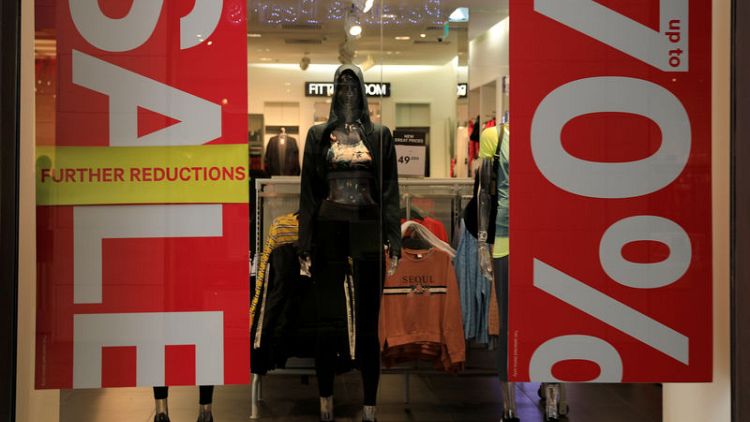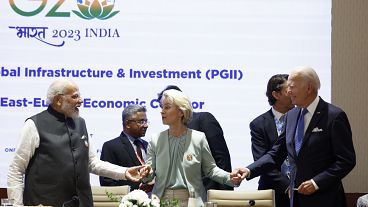By Lisa Barrington and Karin Strohecker
BEIRUT/LONDON (Reuters) - Lebanon's worst bond market shock in a decade has raised doubts about whether the country's banks are willing and able to continue to bankroll the government, raising pressure on Beirut to step up reforms or risk a destabilising currency crisis.
In September the cost of insuring Lebanese sovereign debt against default <LBGV5YUSAC=MG> soared to its highest level since the global financial crisis of 2008, implying a more than 40 percent chance of default in the next five years. Many of the government's dollar-denominated bonds hit record lows, while yield spreads over U.S. Treasury debt scaled historic peaks.
The panic was triggered partly by a wider selloff in global emerging market debt. But when Lebanon's international bonds have fallen in the past, local banks could typically be relied upon to buy up the securities. Not so this time.
"When foreign entities found out Lebanese banks were selling their portfolios heavily, they started to dump theirs," said Marwan Mikhael, chief economist at BlomInvest Bank in Beirut.
Anthony Simond at Standard Aberdeen Asset Management, pointed to a shift in the bond holder structure.
"In the past, local banks were the marginal buyers of the Eurobonds, always. So Lebanon used to really outperform in down markets, because you always had that bid as a backstop," said Simond, a London-based investment manager.
Just over two years ago, Lebanese banks held just under $20 billion of the country's Eurobonds. By July, those holdings stood at just over $16 billion, having fallen to $13 billion in April while the overall debt burden has been rising.
(Changing profile of Lebanon eurobond holdings png, https://tmsnrt.rs/2ImPY7X)
The waning of local banks as reliable bond buyers shifted markets' attention to Lebanon's credit quality when pricing its debt, said Simond. "And the story isn't great."
Lebanon suffers from persistent budget and current account deficits. Credit ratings agencies have classified Lebanon as sub-investment grade - or junk - on a par with Egypt or Angola. S&P Global Ratings warned in August that debt levels would continue to rise from already high levels.
In June, the International Monetary Fund sounded the alarm, urging Beirut to make "immediate and substantial" fiscal adjustment.
SHORING UP
With growth low and traditional sources of foreign exchange - tourism, real estate and foreign investment - undermined by years of regional tension and war in neighbouring Syria, Lebanon is now relying more on the billions of dollars expatriate Lebanese deposit in local banks.
The central bank has been offering high returns to commercial banks depositing dollars, and since mid-2016 has conducted a series of complex financial operations - including debt exchanges with the Ministry of Finance and financial swaps with banks - to obtain even more dollars, helping it to shore up hard currency reserves.
Yet this has reduced the amount of additional hard currency banks can plough into sovereign Eurobonds.
"Do they want to add another $20 million or $50 million (to their holdings)? Probably not, and that makes a huge difference in this market just now," said Simond.
Lebanon has prioritised high FX reserves to defend its two-decade old currency peg, which came recently under pressure following the shock resignation of Prime Minister Saad al-Hariri in November.
Since then, central bank foreign assets, excluding gold, recovered what they had lost defending the pound to hit an all-time high of $45 billion at the end of May, before tapering to $43 billion by mid-September.
Over the past few days, the debt market has calmed down somewhat. Five-year credit default swaps fell back to just over 700 basis points from a peak of 803 bps in mid-September, though they ended August at 642 bps.
Yet foreign investors are trying to gauge the risks if Lebanese bonds face more weakness, which could make it difficult for the government to tap markets abroad at affordable rates.
Research from MUFG Bank showed that almost half of the government's foreign currency debt is due to mature over the next five years.
"The country's balance sheets are by far the worst in the MENA region and, arguably, the emerging world," Jason Turvey at Capital Economics wrote in a recent note to clients, adding that government FX debts amounted to 50 percent of the country's GDP and a rush to the exit by foreign investors could tip the small country into a deeper crisis.
"Sustained capital flight would quickly drain foreign exchange reserves and ultimately force the authorities to devalue the pound."
TOO PESSIMISTIC?
Many Lebanese economists call that scenario too pessimistic, saying only around 11 percent of Lebanon's public debt is held by foreign investors.
"Nobody here is saying there are no challenges, but there's a big difference between having challenges and facing a forced devaluation of the pound and heading towards a Greek or Turkish scenario," said Nassib Ghobril, chief economist at Lebanon's Byblos Bank.
Yet prospects for solutions to Lebanon's underlying problems look distant. Prime Minister Saad al-Hariri pledged in April to cut the state budget deficit, but fiscal reform cannot happen until a government is formed. Politicians have been wrangling over that since elections in May.
Simond said the central bank's financial engineering to support foreign reserves had succeeded for now, but its reliance on inflows of FX deposits from commercial banks meant the situation resembled a Ponzi scheme.
"The central bank has created a system where they are paying someone to pay someone else to bring money in, and it's working, but eventually it may not and that is why they have to reform, and very quickly."
(Reporting by Lisa Barrington in Beirut and Karin Strohecker in London. Graphic by Rivtik Carvalho and Karin Strohecker. Writing by Andrew Torchia and Karin Strohecker; Editing by Elaine Hardcastle)



